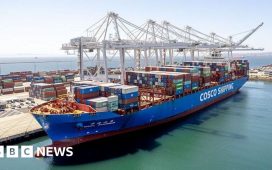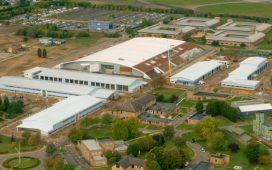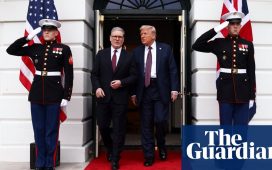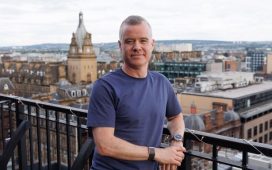Unlock the Editor’s Digest for free
Roula Khalaf, Editor of the FT, selects her favourite stories in this weekly newsletter.
Sir Keir Starmer, UK prime minister, has opened the door to Britain “offshoring” the processing of asylum claims, as he put the fight against irregular migration at the heart of his bid to rebuild ties with Europe.
Starmer said after hosting a meeting of European leaders in Oxfordshire that there was “interest” in a deal under which Italy sends asylum seekers to Albania for processing.
“I’m a practical person — I’ve always said I will look at what works,” Starmer said on Thursday at the European Political Community meeting, although he stressed the main focus of the 44 leaders was tackling people smuggling gangs.
“Where cases can be processed closer to origin, that is something which ought to be looked at,” he added.
Curbing irregular migration and boosting defence and security co-operation formed the basis of talks on Thursday at Blenheim Palace, with leaders of the EPC, a group that includes the 27 EU member states and all other European countries bar Russia and Belarus.
The EPC meeting — hosted by Starmer at the birthplace of Sir Winston Churchill, UK prime minister during the second world war — was viewed as a key moment for the new premier to repair frayed relations after Brexit.
At the EPC meeting Starmer attended a “breakout” session on migration chaired by Giorgia Meloni, Italy’s prime minister, and Edi Rama, Albania’s prime minister, who have co-operated closely on the issue.

Rome and Tirana agreed last year to set up centres in Albania where a few thousand Italy-bound migrants would be registered before waiting for their asylum claim to be processed by Italian officials. If their claim was accepted they would return to Italy.
The deal is different to the Rwanda scheme proposed by former UK Prime Minister Rishi Sunak — scrapped by Starmer on his first day in power — where undocumented migrants arriving in the UK would be sent to the east African country but would never be allowed to return to Britain.
Rama has called the accord a “one-off” but 15 other EU countries, led by Denmark, in May called for more third-country processing of asylum claims. In 2004 Tony Blair, former Labour premier, considered offshoring claims to Tanzania.
Starmer said: “This summit is an opportunity to set a new path on illegal migration, to transform the way that we work together on border security and law enforcement and to say together ‘no more’.”
He announced £84mn of funding to try to tackle the irregular migration at source, with money allocated to training and education schemes in countries in the Middle East and Africa.
At the start of the EPC Starmer vowed his government would “never withdraw from the European Convention on Human Rights”, following threats from the Sunak government that the UK might quit if the convention thwarted its attempts to remove migrants to Rwanda.
To underline the commitment Starmer arranged for the Treaty of London, which was signed in 1949 and gave birth to the ECHR, to be put on display at Blenheim. Churchill was seen as one of the authors of the idea.
UK officials are hopeful Starmer’s stance and clarity on the subject will foster better co-operation on tackling irregular migration with other European partners, including Germany in particular.
His promise of a “reset” of the UK’s relations with Europe was well received by guests at Blenheim. “It’s a great relief,” said one European diplomat. “It’s very, very positive. This is the first post-Brexit government.”
Another said they appreciated Starmer being a “direct and uncomplicated leader”.
Charles Michel, president of the European Council, which represents EU leaders, said it would be “good if in the months to come there would be a bilateral summit, so that we can show that this relationship is a strategic one”.
British officials said the idea of an EU/UK summit was being discussed to develop Starmer’s proposal for a defence and security pact, which would also cover topics such as migration and energy.
French President Emmanuel Macron said: “This is a great opportunity for a reset.”
Starmer, speaking at the opening session of the EPC, told the assembled European leaders: “Britain will be a friend and a partner ready to work with you. Not part of the European Union, but very much part of Europe.”
Starmer said he detected a “real appetite” among EU leaders for a closer relationship with Britain, including on economic links and trade. “We do want to get a better deal than the one we’ve got at the moment,” he said.
He later met Macron for a post-summit dinner, amid signs that co-operation between Britain and France in tackling cross-border migration has already improved.









